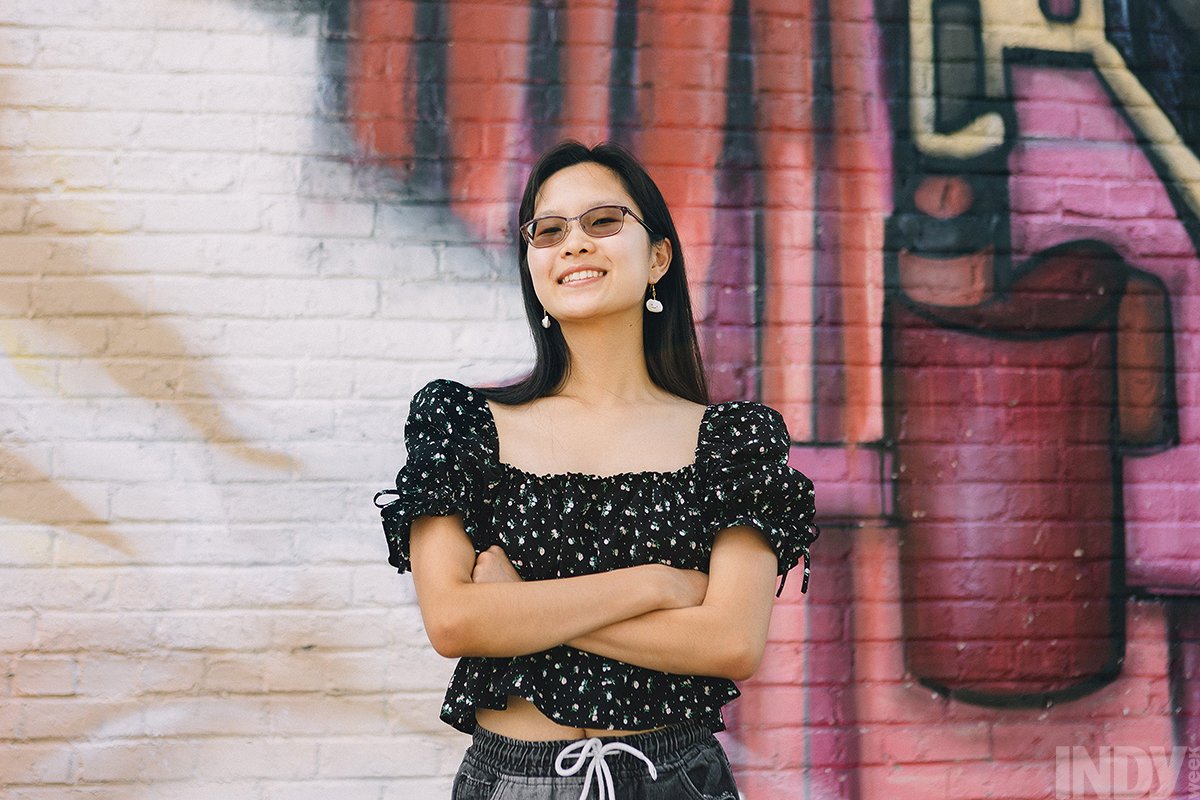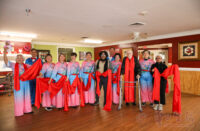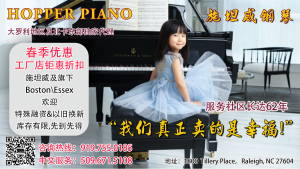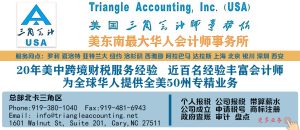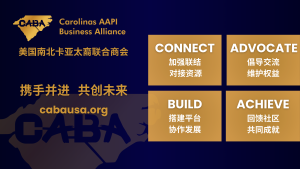【华e生活毛苌子报道】您知道您让孩子带到学校的午饭带给她/他困扰吗?您绝不会想到,在您称赞孩子漂亮时,她/他却在心里觉得您是在嘲讽。
今年夏天从凯瑞Green Level高中毕业、即将就读杜克大学的18岁女孩国羽英(Aida Guo),参加讲述亚裔美国人故事的公益平台“今天制造噪音”(#makenoisetoday)举办的“书信”(Letters to …)比赛,她的作品《我漂亮所以你漂亮》(I am beautiful so you are beautiful )在全美900余篇参赛作品中脱颖而出,荣获第一名,正在加州长滩(Long Beach)Billie Jean King图书馆与其他优秀作品一起展出(作品附后)。
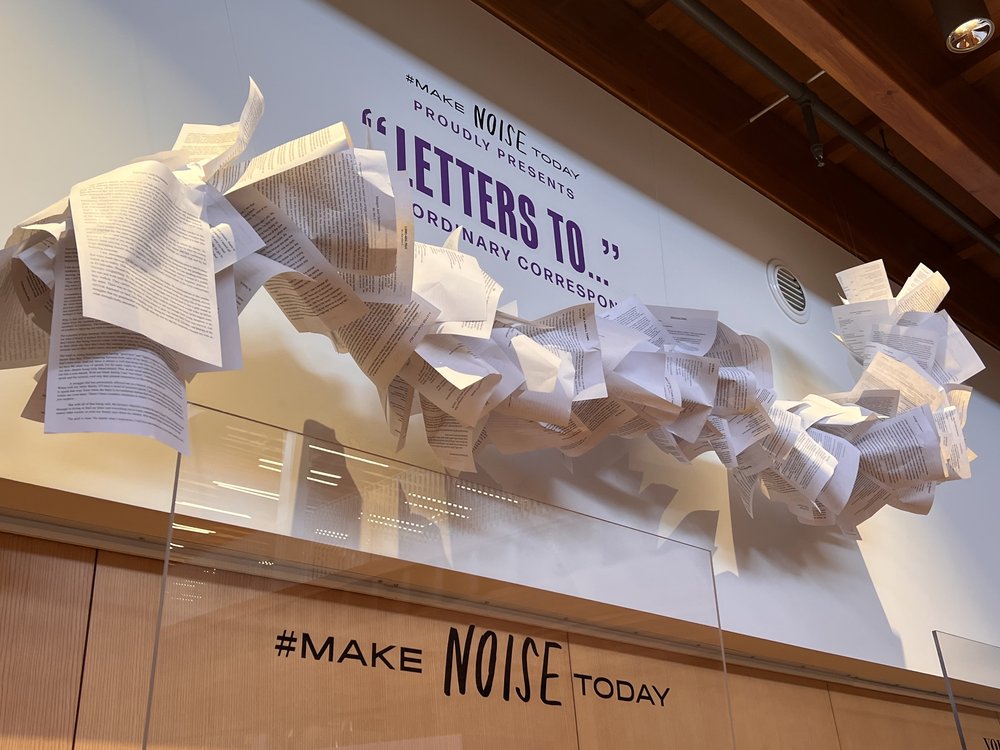
国羽英的作品及其获奖消息,引起凯瑞市媒体Indy周刊的关注。记者专访Aida请她讲述了参加这次写作比赛的动机和收获(专访附后)。
如果不是孩子写出来,作为父母真不知道孩子有那些“匪夷所思”的经历和心思。
有感于Aida参赛作文中真是记述的华二代叛逆心理,【华e生活】访问了Aida和她的妈妈——
问:通过披露她在文化冲突中经历的压抑和扭曲,《写给妈妈》除了表达对妈妈的爱,希望给读者带去什么信息?
Aida: 我是一个华裔移民的后代,成长中总有孤独感。不是因为我没有朋友或人可以去交流,而是经历的很多事情让我感到孤独,比如被忽视,被冷落甚至被羞辱。我不明白这是因为种族主义和白人至上的文化带给我的感受。直到我开始聆听、阅读和寻找其他边缘化人群的故事, 我才开始了解自己的经历和这些人的生活经历息息相关。我听到的那些故事对我的成长来说是无价的,所以我希望可以分享我的故事,为那些曾经的孤独和正在经历的孤独发声。“Make Noise Today” 给了我这个机会。
妈妈:青春期孩子的叛逆很多是源于困惑,不自信,不理解。作为华裔孩子,他们有的经历很多我们作为家长是不知道的。而孩子也不确定自己是否正确。成长本就是不断肯定与否定,就像蜕变一样,什么都可以否定,但不能否定自信。自信就是相信自己是向着阳光的方向长大,就是相信自己是美丽的。
在Aida 初中时打排球,排球俱乐部的教练说:“你叫什么名字?不所谓啦,就叫你X吧。”(What is your name? Whatever, let me call you X)能想象吗?教练当着所有队员的面叫她X。我也是好多年以后才知道的。
上小学的时候,老师要安排她去上英语第二语言班(English Second language class)。Aida 是美国出生长大的孩子,英语是母语。老师没有耐心的去了解孩子的英文水平,就要送孩子去上英文补习班。在老师眼里,亚裔孩子的英文理所应当不够好。我们坚决没让孩子去。太可笑了。后来和别的家长聊天,别的孩子也有类似的经历。
问:走过自己的少女时代,她的经历和感受,可以给和像她一样的华二代孩子什么样的建议?给华人家长教育子女什么样的启发?
Aida:无论你做什么,无论你多么努力,你的父母和你之间总会有一些距离,让你成为第一代和第二代。在我们共同成长的过程中,难免会有误解、冲突和伤害。对我来说反思一直很有意义,我的反思方法就是 写作,分享,再写作。每个人都可能有自己喜欢的方式:绘画、烹饪、冥想、走路,不胜枚举。承认那些让我感到羞耻的时刻真的很难,作为移民的女儿和有色人种,阅读、写作和分享自己的故事,确实非常治愈,也让我开心地长大。
妈妈:Aida 在Green Level高中时的网上发表了将近200篇文章(https://thegatorseye.com/staff_name/a-guo/),疫情里还创办了学校的第一本杂志。大概从16岁开始,她每天早上她都听着新闻起床。如果我俩白天有什么争执,我知道她肯定睡前要写下来才去睡觉。写下来对她来说是表达,宣泄,思考,解脱。其实写作本身是很自我的一件事情。从小她就有写的习惯,无论旅游还是参加排球比赛,她都带着她的两个小本本,一个写一个画。
我想说让孩子认为孩子自己很漂亮不仅是对自己外貌的认可,更是对自己和自己文化的认可。人无论是哪个民族,无论是否有残疾,无论是胖是瘦都是美丽的,生命是美丽的。尤其今天的女孩子,外貌焦虑是很严重的问题,进食障碍是导致美国青少年女孩子死亡的第三大原因。
问:即将到杜克求学,有什么打算?
Aida:像很多人一样,我还没有选定专业,我会坚持写作。作为一个内向的华裔女孩,在北卡罗来纳州长大的经历让我对倾听边缘化的声音产生了很大的兴趣。在杜克大学,我希望可以对不同的事情不同的人有更多的了解和认识。
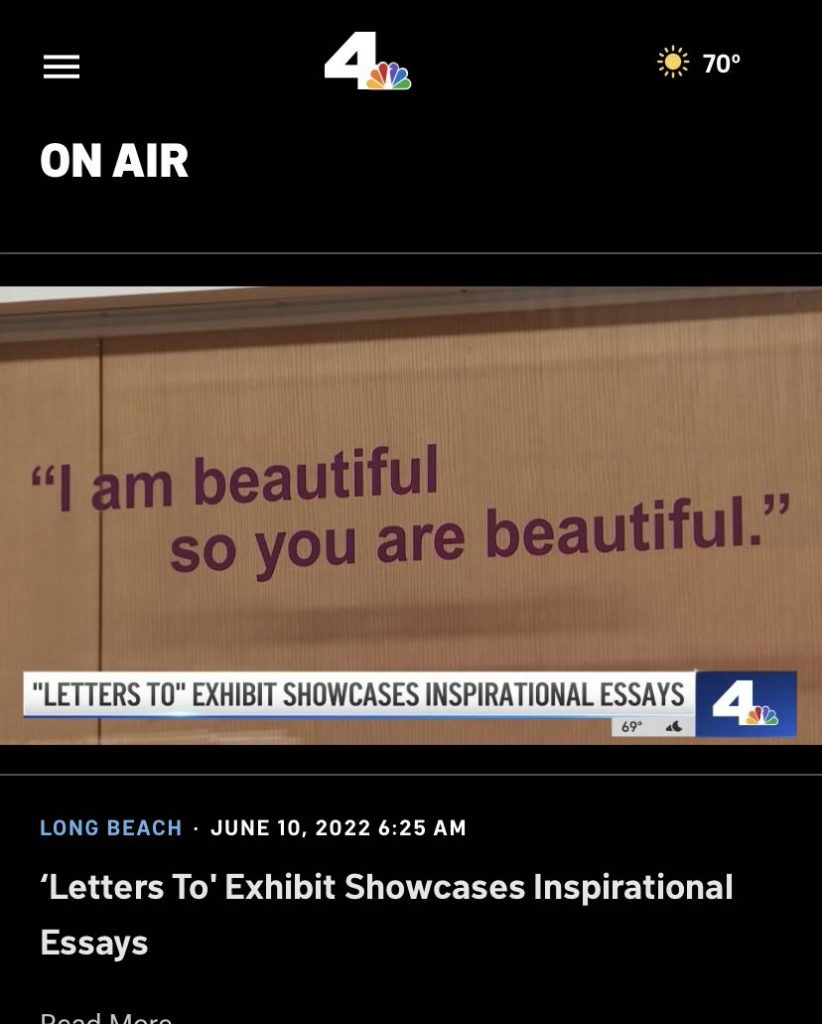
获奖作品:
附一
我漂亮所以你漂亮
妈妈,
在我的生命里你经常对我说“你好可爱,你好漂亮,你真好看。” 你说的那么自然,那么简单,那么的理所当然。就像每天睡觉前都要刷牙,上班要开车一样正常。顶着我那不愿梳理的长发,有点鼓鼓的肚子和丰满的脸蛋,我从不去考虑好看是个啥。
不知从何时起,我发现自己参加聚会时,开始涂眼影,化妆,穿漂亮裙子。美丽到底是什么?为什么我会有这样的愿望,我对漂亮充满了好奇。我漂亮吗?
“我漂亮所以你漂亮呀。”你会这么告诉我,说完我们俩会一起大笑。我完全相信你。因为你是那个唱着中国摇篮曲哄我入睡的人,在我不敢跳舞而哭泣时与我共舞的人,你就像所有单亲母亲那样是用你坚强的羽翼呵护着我的人, 你是我最信赖的人。
但事实证明,我,第一代华裔美国女孩不可避免地去追求白人文化。即使你是我唯一完全信任的人。我开始花更多时间在学校而不是和你在一起,我的周围基本都是白人。我开始怀疑你的信念,你的文化。我隐隐觉得白人的文化才是最有魅力的。这让我困惑。
我认为一口流利的英文才是时尚,你的口音让我感到尴尬。当学校的白人老师对我微笑并询问我的生活时,我有强烈的被接受了的感觉。当白人老师把我的害羞归结于你的离婚时,我相信她而不是你。当学校“好”受欢迎的白人女孩告诉我我的食物闻起来很奇怪时,我会尽量藏起我的午餐不让同学们闻到我中饭的味道。即便你不在我身边,我也会因为你让我难堪而生气。我渐渐长大也渐渐地明白我错了。我的肤色,我的文化是多么的值得我骄傲。周围的很多声音都是很肤浅的,不是吗?
最终,我还是被社会对漂亮的定义洗脑了。我饿了自己几个月,体重迅速下降,不去吃那些以前喜欢的中式家常饭,生理周期也开始紊乱了。在太阳升起之前,我不介意牺牲睡眠时间去把眼睛画得更大。我不在意老师或教练故意把我的名字叫错,即便那只是三个简单的音节(Guo),我甚至可以理解他们对我的忽视。我追逐着那些对我无动于衷的白人主导的文化, 我相信他们而不是你。
每次当你夸我漂亮时,我都会觉得这是一种嘲讽。我觉得你只是在开玩笑,我心里想:撒谎。我会低声对自己说:骗人。我不想听你说,我渴望得到那些代表着时尚和主流的陌生人的随口的赞美。不,我不喜欢他们那随意而又敷衍的赞美,追求像白人一样的主流的想法开始破裂。而你从未破裂,因为你和你的赞美是真实的。
2021年春天,新闻里我看到我们的长辈被杀,我痛苦地喊叫,是你在安慰我,而不是他们。当他们让我们为他们犯的罪买单,让我们来当替罪羊时,是你握住了我的手,是你倾听我心里的困惑,是你一如既往地相信我。你给我讲我们以往的故事:文化大革命中我爸爸去做工而不能去上学,我姥爷在唐山大地震时搬移尸体,还有你作为第一代移民的孤独。
他们一次又一次地欺负着我,认为在他们祖辈偷来的土地上,我还不足以像他们一样被接纳被尊重。
终于我接受了你对我的接受,我接受了你对我的自豪。
当我试图拒绝你和你的照顾时,你照样帮我清理着我的凌乱,温暖着每一个日子。你不断地低语着你的故事你的信念,我就这样一点一点被治愈。
虽然我曾无情地背叛过你,但你始终坚信着我。
谢谢你,妈妈。随着明天的到来,还会有更多的困难或许是创伤。我希望你知道:在我心里你很漂亮,我也很漂亮;我希望你知道:我相信你,也相信我自己;我希望你知道:无论未来有多么困难的奋斗,我都会和你站在一起。
爱您的,
国羽英
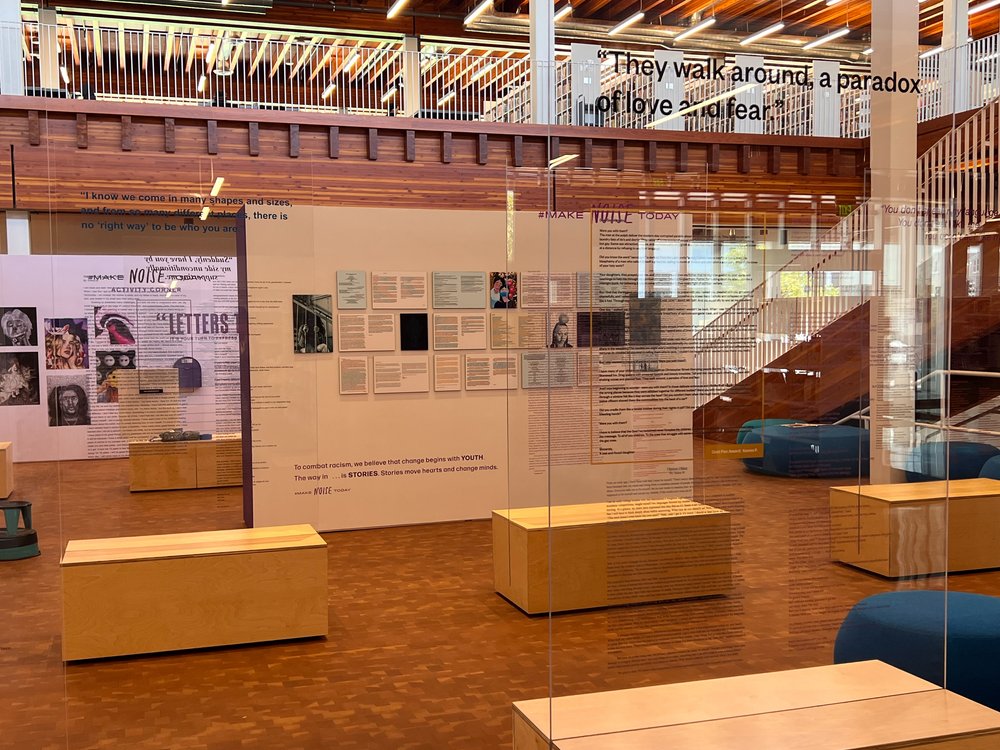
原文——
I am beautiful so you are beautiful
Mama,
For my whole life, you have called me beautiful, “你好可爱,你好漂亮,你真好看.” You made it sound so simple, so obvious, so easy. It was part of your daily dialogue, equivalent to something of a necessity like brushing your teeth or driving to work. So I didn’t think about it with you: not my tangled hair nor my filled face and belly.
But as I found myself attending dress-up playdates where the desire was glittery eyeshadow and glass slippers, I also grew curious about the word. What does beautiful mean? And why am I considered so?
“我漂亮所以你漂亮呀,” you would tell me, “I am beautiful so you are beautiful.” We would laugh and I would believe you. For you were the one who taught me strength as a single mother, who sang me to sleep in Chinese lullabies, and who danced with me when I cried. You were the one to trust.
But it turns out a first-generation Chinese-American girl is not immune to the pursuit of whiteness even if you tell her she is worthy. Even if you are the only one she trusts.
Because I started to spend more time with school than with you and my faith in your promises stretched into skepticism of contradictions. The problem was I began to confuse whiteness with charisma.
I mistook the fluency of English for warmth and I cringed at your accent. Like when my white counselor would smile and ask me about myself, I would feel accepted. So when she wrote off my shyness as your mistake in divorce, I believed her instead of you. Or when the “nice” popular girl told me my food smelled weird, I would hide the smell of my lunch on the yellow bus to school. I would get mad at you for embarrassing me even without being there.
Of course, my road was not linear. I grew. I understood what I did wrong and how this skin was something to be proud of. But still, the words came from the wrong people and the message was always surface level.
Eventually, I became brainwashed to the beat of false empowerment. I starved my body for months, losing my period and throwing away piles of home cooked food. I exchanged sleep to paint my eyes bigger before the sun rose. I let go of ownership to my three-syllable name, creating sympathy for intended mispronunciation. I was still chasing whoever and whatever was apathetic to me. I still believed them more than I believed you.
So every time you called me beautiful, I would think of it as a mockery. How could you make fun of me like that? I would think. What a lie, I would whisper, what a lie. Instead of listening to you, I would crave the praise of random light-bodies I did not know. The praise from random light-bodies I did not like.
But then, the idealism of whiteness began to crack.
You did not.
You never cracked, because you were real.
In the spring of 2021, I saw our elders murdered on the streets and as I shouted in pain, it was you who comforted me, not them. While they turned their heads to whisper and call us names, while they scapegoated us for the problems they made, you held me. You listened to me. You believed me. You told me about the gruesome history of my heritage: my father’s childhood amidst the Chinese Cultural Revolution, my grandfather shoveling dead bodies in Tangshan, your lonely immigration to America. And while they bullied me again and again: deeming me inadequate on the land they stole, I finally came to terms with your acceptance and pride in me.
While I attempted to reject you and your care, you tucked my hair and made my bed. You kept whispering your truths to me, healing me in steps. Despite my relentless betrayal, you believed in me.
So thank you, mama. As the world carries on, it seems there will be endless dilemmas we will face. The news rages of more trauma to come. But I hope you know I know you are beautiful and I am beautiful. I hope you know I believe you and myself. I hope you know the rest of this fight will be me and you together.
Love,爱
Aida Guo
附二
凯瑞Indy周刊专访——
15分钟:Aida郭,18岁
你是怎么听说#makenoisetoday “Letters to …”比赛的?是什么让你想要参赛的?
我是在北卡的“Asian Americans Together” 的网站上看到这个比赛的。我是一名应届高中生毕业生,参加这个比赛是一个很好的申请奖学金的机会,而且我本来就喜欢给人写信。给那个对你自我定义有深刻影响的人写信, 对我很有吸引力。申请大学也让我有机会更多更深思考关于自我定义的问题。所以我最终决定参加这个比赛。
“妈妈”,这封信对你意味着什么?
我给我mom写了一封信,或者用中文说是妈妈。自从我上学前班,基本就是妈妈一个人在带我,我和妈妈很亲近。我生命中的大部分时间都是我和她,我们也会有起起落落的时候,特别是因为她是一位来自中国的移民。就像你知道的,她的英文有口音,而且她和我有着不同的文化背景。在我的成长中,这对我有很大的压力。上高中后,对周围各种不同人群有了更多的认识,白的,非白的。所以这就像给我妈妈的一封情书,为我所做的一些事情道歉,也想告诉她,我们会永远在一起。
你认为这次比赛给你和其他同学一个很好的机会来发声,并分享你们对种族不平等的看法吗?
我没能亲自到加州的展览现场,但我在线阅读了很多人的文章/信。很高兴能和来自全国各地的学生们共同分享彼此生命里的困惑和脆弱感受。我还联系了一个来自南卡罗来纳州的女孩,她也是亚裔美国人,我们彼此有很多相似的经历,交流很轻松。其实除了亚裔美国人,与其他少数族裔的学生们交流,我们也有着很是相似的成长经历。能听到这么多人的声音并阅读大家的作品真是很开心。
这次经历中最难的是什么?最大的收获是什么?
最难的是,我要在信里写出我认为自己错了的事情,写一些我不想提的事情。我提到了我小时候,会为妈妈的口音,或者妈妈给带的中饭感到尴尬。我相信生活里 很多同学也有和我一样的经历,但写出来承认还是挺难的。我认为这真的很有意义,因为在写完所有内容后,我可以更好的接受我自己,这就像是我生命旅程的一部分,也是我的一部分,正是这些经历让我长大。
你认为你会从这里开启你更强大的写作之路吗?
无论何时何地我总是可以写。像在 Instagram上 发帖子或者写短信,工作和生活处处离不开写,进入大学及以后,我也想继续写作和在不同的媒体上发表文章。写作对我来说是生活的一部分,也是我愿意与他人分享的东西。
你的妈妈、朋友和老师是否支持你度过那些困难的时刻?你妈妈读过这封信吗?
这篇文章有点像我在高中四年级写的很多不同东西的积累,很多同学肯定读过它的不同部分。我是在我知道获奖之后,才给妈妈读的这封信。老实说,我有点担心妈妈的反应,但她读了以后很高兴。我们是心连心的。
如果你能告诉正在考虑参加这次比赛的人一件事,你会说什么?
你绝对应该尝试——尝试进入自己生命里曾经的那些脆弱和困惑的时刻然后把它写出来。你的作品是你可以一直拥有并与人们分享的东西,这本身就是一件很棒的事情。更重要的是,能够与一群与你同龄的人建立一种更密切和真挚的联系,这很难得。我期望更多的人来参加这个比赛。
原文——
15 Minutes: Aida Guo, 18
Green Level High School graduate and winner of the #makenoisetoday “Letters to …” contest out of 900 entries on the subject of race, ethnicity, and identity.
BY HANNAH KAUFMAN JUL. 13, 2022 5:58 A.M.
How did you first hear about the#makenoisetoday “Letters to …” contest, and what inspired you to enter?
I actually saw this on a website from North Carolina Asian Americans together. I was a senior in high school, so I was applying to colleges and thinking about how this was a pretty good scholarship opportunity and how I like writing, and the prompt of writing a letter to somebody who had impacted your identity stuck out to me, since I’d thought a lot about my identity during college applications. So I ended up applying.
Tell me about your letter, “Mama”? What does the letter mean to you?
I wrote a letter to my mom, or my mama, which is how I call her in Chinese. She’s raised me as a single mother since I was in kindergarten, so I’ve grown really close to her. It’s just been me and her for a lot of my life, and there’s been a lot of ups and downs, especially since she’s an immigrant mom from China and, you know, she has an accent and she grew up in a different culture.
So there was kind of a lot of tension as I grew up, once I started going to American high school and was surrounded more by different aspects of American identity and whiteness and everything. So it’s like a love letter to my mom and to kind of apologize for some stuff I’ve done and then also just say that we’re going to be together until we can’t.
Do you think this contest gave you and other students a place to amplify your voice and share your perspective on racial inequities?
I couldn’t be there in person, but I was there virtually for the readings, and I also read through the actual online essays that other people wrote, and it was nice to hear people from across the country share these vulnerable feelings. And I even connected with a girl, I think from South Carolina, who was also Asian American, and we kind of just connected by talking about our identities and we related a lot to each other. But even just with people who weren’t Asian American, who were other ethnicities or races, a lot of our struggles are intertwined and so it was just really nice hearing everyone and reading everyone’s work.
What was the hardest part of this experience? The most rewarding?
The hardest part of this experience was, when writing, I definitely had to be pretty honest with myself and some of the things I’m actually pretty ashamed of doing. I mentioned some of the stuff I would do when I was younger, like feeling embarrassed when my mom would talk or [about] the food that she packed. A lot of people go through that, but that was pretty hard to actually admit to myself. But I think it was really rewarding, because after writing everything I could come to terms with how I grew and just like how this is kind of part of my journey and part of who I am, and now I can grow from those experiences.
Where do you think you will take your powerful words and writing talent from here?
No matter what space I’m in, I can always use my writing. Whether that be like, just an Instagram post or a text message, but it could also be in life through work or as I join college and beyond, in different magazines or newspapers. But no matter where I go, writing will always be a safe space for me and something that I always want to share with other people.
Did your mom, friends, and teachers support you through this? Did your mom read the letter?
This essay was kind of like an accumulation of a lot of different stuff I had written throughout my senior year of high school, but a lot of people definitely read different parts of it. I would say that I didn’t really have my mom read it until actually after I had gotten the scholarship award, because it was kind of vulnerable and I was honestly kind of scared of my mom’s reaction, but she was very happy, and we had a nice heart-to-heart.
If you could tell someone who’s considering entering this contest one thing, what would you say?
You should definitely try and enter—try and be as vulnerable as you can and just look back on your own experiences. Just the experience of writing is really rewarding and it’s something you can always have and share with people and that’s a really great thing itself. But even further than that, being able to have this connection to a bunch of other people your age around your identity is something kind of hard to come by. So this is a really great opportunity for that and I would totally recommend it to anyone who’s interested.

